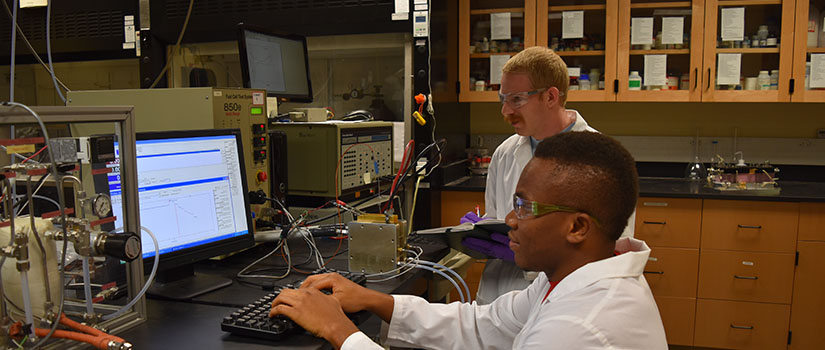Hydrogen and Fuel Cell Center
Our mission is to promote and support the growth of an electrochemistry industry by
providing technological leadership with a vigorous program of research, development
and demonstration. By serving as a locus for academic talent of the highest caliber
and a non-profit site for the objective evaluation and improvement of industrial products,
our goal is to become a primary leader for the understanding and advancement of fuel
cell, electrolyzer, and battery technology.
Overview
We aim to help industry advance the technology and commercialization of electrocatalytic
processes by training graduate students and performing research within the areas of:
- fuel cell design and performance;
- hydrogen production by electrolysis of low-value feedstocks;
- Energy storage in battery systems
- electrolysis process design and performance;
- new catalysts for hydrogen production
The Hydrogen and Fuel Cell Center is located in the Department of Chemical Engineering
in the Horizon I Building at the University of South Carolina. Our research center
is focused on the integrated study of electrochemical systems, including electrolyzers,
fuel cells, and batteries. Electrolyzers have a wide range of applications and are
of interest for combined hydrogen and high-value chemical production. Fuel cells continue
to show promise as a future power source for automobiles, residences and commercial
products. Batteries are key to integration of energy storage for power on demand.
We work closely with industry to develop and advance electrocatalytic processes that
will serve companies all over the world.
Center Updates
DoE/EERE – Avcarb – GDL for Fuel Cells
The Hydrogen and Fuel Cell Center will be working with a consortium of partners,
including Avcarb and UC-Irvine on the design, characterization, and industrial-scale
domestic manufacturing of gas diffusion materials for use in fuel cells.
South Carolina Fraunhofer USA Alliance
The Hydrogen and Fuel Cell Center at USC will work with South Carolina Department
of Commerce, JTEKT, Celadyne, and Fraunhofer USA on the development, characterization,
and manufacturing of bipolar plates for kilowatt-scale electrolyzer stacks. The HFCC
will be responsible for modeling the fluid flows within the electrolyzer to optimize
the flow-field design of the bipolar plates and conducting performance testing of
small-scale stacks.
BASF Partners with Hydrogen and Fuel Cell Center Continues
The chemical giant BASF, based in Ludwigshafen, Germany, is collaborating with the
Hydrogen and Fuel Cell Center to explore and develop new electrochemical synthesis
methods for recycling industrial byproducts in simpler and more economical ways. This
partnership also draws on the expertise of Dr. Brian Benicewicz, known worldwide for
his work in polymers and polymer membranes.
Partnership with General Motors Continues
General Motors Company continues to collaborate with Dr. Shimpalee to develop a microstructure
model for lithium-ion batteries.
SRNL Continues to Support Dr. Shimpalee
Dr. Shimpalee is participating in three recent awarded projects from Savannah River
National Laboratory. His team will 1) develop multiscale modeling to predict electromagnetic-assisted
electrochemical conversion of CO2 to High Value Chemicals, 2) develop the model reaction
and multi-phase transport of liquids and gases in a chromatographic column for the
separation of various gases, and 3) develop the model that can predict waste reduction
using SRNL Vapor Digestion Technology.
